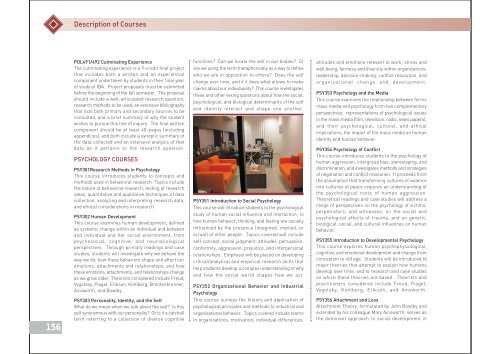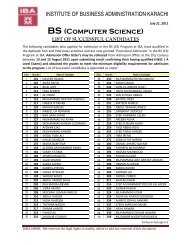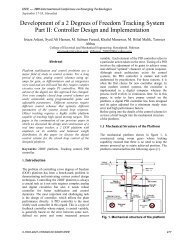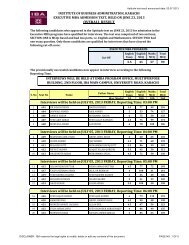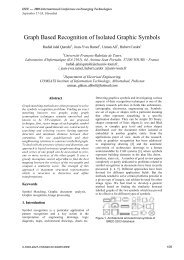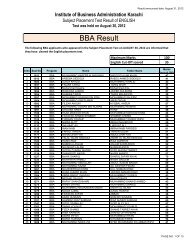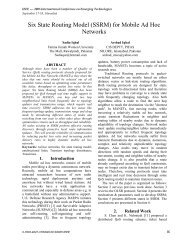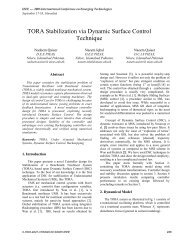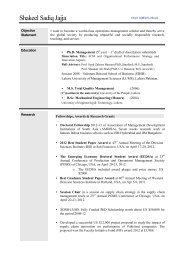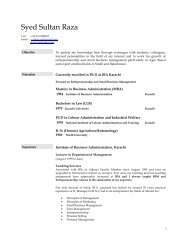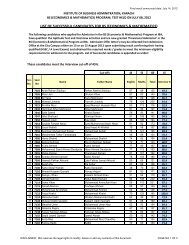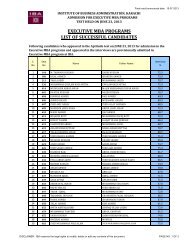Program Announcement 2013 - 14 - Institute of Business ...
Program Announcement 2013 - 14 - Institute of Business ...
Program Announcement 2013 - 14 - Institute of Business ...
Create successful ePaper yourself
Turn your PDF publications into a flip-book with our unique Google optimized e-Paper software.
Description <strong>of</strong> Courses156POL491/492 Culminating ExperienceThe culminating experience is a 9-credit final projectthat includes both a written and an experientialcomponent undertaken by students in their final year<strong>of</strong> study at IBA. Project proposals must be submittedbefore the beginning <strong>of</strong> the fall semester. The proposalshould include a well-articulated research question,research methods to be used, an extensive bibliographythat lists both primary and secondary sources to beconsulted, and a brief summary <strong>of</strong> why the studentwishes to pursue this line <strong>of</strong> inquiry. The final writtencomponent should be at least 40-pages (includingappendices), and both include a synoptic summary <strong>of</strong>the data collected and an extensive analysis <strong>of</strong> thatdata as it pertains to the research question.PSYCHOLOGY COURSESPSY301Research Methods in PsychologyThis course introduces students to concepts andmethods used in behavioral research. Topics includethe nature <strong>of</strong> behavioral research, testing <strong>of</strong> researchideas, quantitative and qualitative techniques <strong>of</strong> datacollection, analyzing and interpreting research data,and ethical considerations in research.PSY302 Human DevelopmentThis course examines human development, definedas systemic change within an individual and betweenand individual and her social environment, frompsychosocial, cognitive, and neurobiologicalperspectives. Through primary readings and casestudies, students will investigate why we behave theway we do, how these behaviors shape and affect ouremotions, attachments and relationships, and howthese emotions, attachments, and relationships changeas we grow older. Theorists considered include Freud,Vygotsky, Piaget, Erikson, Kohlberg, Bronfenbrenner,Ainsworth, and Bowlby.PSY303 Personality, Identity, and the SelfWhat do we mean when we talk about the self? Is thisself synonymous with our personality? Or is it a catchallterm referring to a collection <strong>of</strong> diverse cognitivefunctions? Can we locate the self in our bodies? Orare we using the term metaphorically as a way to definewho we are in opposition to others? Does the selfchange over time, and if it does what allows to makeclaims about our individuality? This course investigatesthese and other vexing questions about how the social,psychological, and biological determinants <strong>of</strong> the selfand identity interact and shape one another.PSY351 Introduction to Social PsychologyThis course will introduce students to the psychologicalstudy <strong>of</strong> human social influence and interaction, tohow human behavior, thinking, and feeling are sociallyinfluenced by the presence (imagined, implied, oractual) <strong>of</strong> other people. Topics covered will includeself-concept, social judgment, attitudes, persuasion,conformity, aggression, prejudice, and interpersonalrelationships. Emphasis will be placed on developingcritical/analytical and empirical research skills thathelp students develop a complex understanding <strong>of</strong> whyand how the social world shapes how we act.PSY352 Organizational Behavior and IndustrialPsychologyThis course surveys the history and application <strong>of</strong>psychological principles and methods to industrial andorganizational behavior. Topics covered include teamsin organizations, motivation, individual differences,attitudes and emotions relevant to work, stress andwell being, fairness and diversity within organizations,leadership, decision-making, conflict resolution, andorganizational change and development.PSY353 Psychology and the MediaThis course examines the relationship between formsmass media and psychology from two complementaryperspectives: representations <strong>of</strong> psychological issuesin the mass media (film, television, radio, news papers),and their psychological, cultural, and ethicalimplications; the impact <strong>of</strong> the mass media on humanidentity and human behavior.PSY354 Psychology <strong>of</strong> ConflictThis course introduces students to the psychology <strong>of</strong>human aggression, intergroup bias, stereotyping, anddiscrimination, and investigates methods and strategies<strong>of</strong> negotiation and conflict resolution. It proceeds fromthe assumption that transforming cultures <strong>of</strong> violenceinto cultures <strong>of</strong> peace requires an understanding <strong>of</strong>the psychological roots <strong>of</strong> human aggression.Theoretical readings and case studies will address arange <strong>of</strong> perspectives on the psychology <strong>of</strong> victims,perpetrators, and witnesses; on the social andpsychological effects <strong>of</strong> trauma; and on genetic,biological, social, and cultural influences on humanbehavior.PSY355 Introduction to Developmental PsychologyThis course explores human psychophysiological,cognitive, and emotional development and change fromconception to old age. Students will be introduced tomajor theories that attempt to explain how humansdevelop over time, and to research and case studieson which these theories are based. Theorists andpractitioners considered include Freud, Piaget,Vygotsky, Kohlberg, Erikson, and Ainsworth.PSY356 Attachment and LossAttachment Theory, formulated by John Bowlby andextended by his colleague Mary Ainsworth, serves asthe dominant approach to social development in


